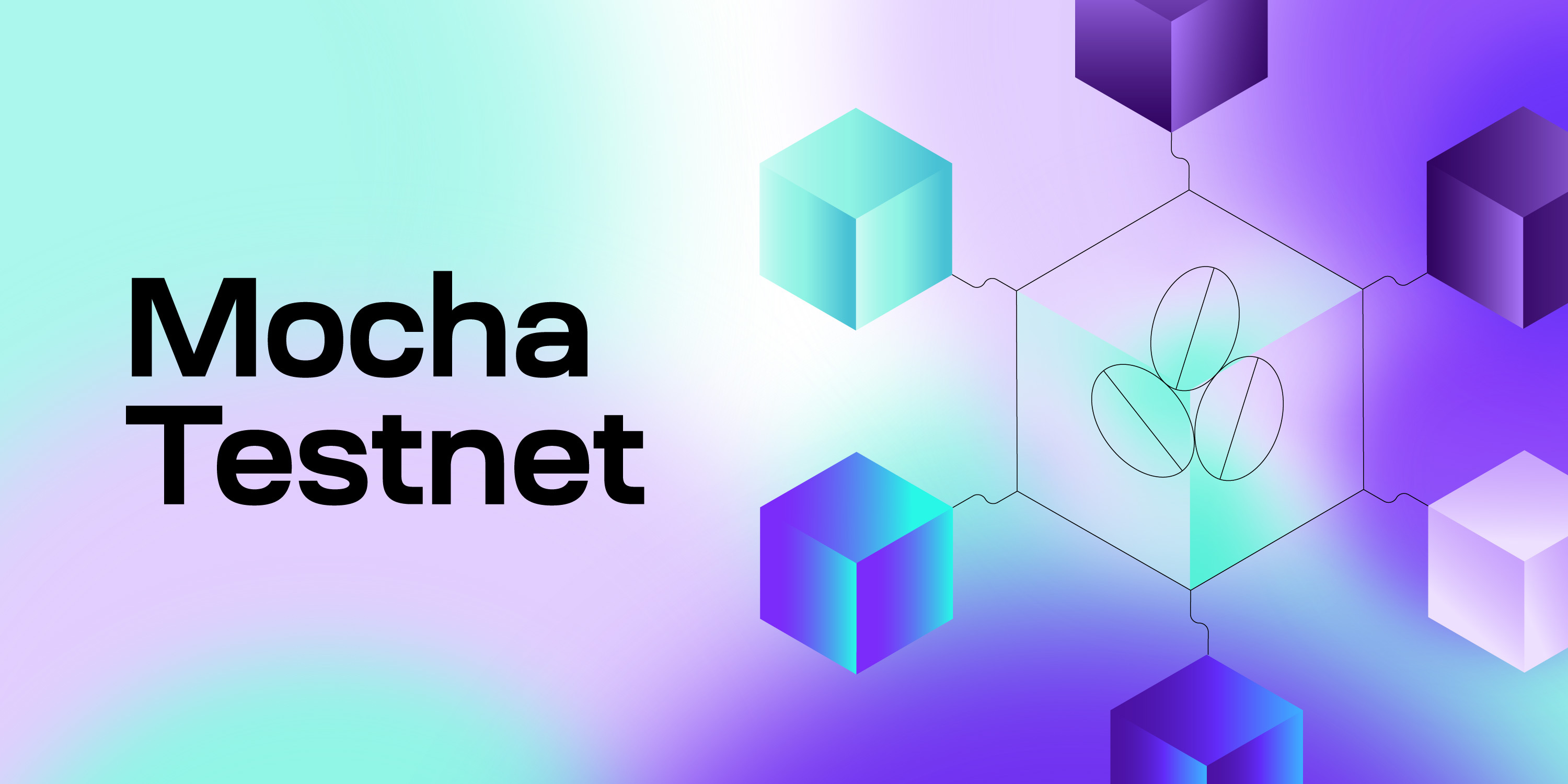Mocha testnet

This guide contains the relevant sections for how to connect to Mocha, depending on the type of node you are running. Mocha testnet is designed to help validators test out their infrastructure and node software. Developers are encouraged to deploy their sovereign rollups on Mocha, but we also recommend Arabica devnet for that as it is designed for development purposes.
Mocha is a milestone in Celestia, allowing everyone to test out core functionalities on the network. Read the announcement. Your best approach to participating is to first determine which node you would like to run. Each node's guide will link to the relevant networks, to show you how to connect to them.
You have a list of options on the types of nodes you can run to participate in Mocha:
Consensus:
Data Availability:
Select the type of node you would like to run and follow the instructions on each respective page. Whenever you are asked to select the type of network you want to connect to in those guides, select Mocha to refer to the correct instructions on this page on how to connect to Mocha.
Network details
| Detail | Value |
|---|---|
| Chain ID | mocha-4 |
| Genesis hash | B93BBE20A0FBFDF955811B6420F8433904664D45DB4BF51022BE4200C1A1680D |
| Genesis file | https://github.com/celestiaorg/networks/blob/master/mocha-4/genesis.json |
| Peers file | https://github.com/celestiaorg/networks/blob/master/mocha-4/peers.txt |
| Validators | 100 |
Software version numbers
| Software | Version |
|---|---|
| celestia-node | v0.13.3 |
| celestia-app | v1.7.0 |
RPC for DA bridge, full, and light nodes
These RPC endpoints for DA nodes are to provide state access for querying the chain’s state and broadcasting transactions (balances, blobs, etc.) to the Celestia network. For users, they will need to provide a –core.ip string from a consensus node’s URL or IP that populates 2 ports for 2 types (RPC and gRPC, at ports 26657 and 9090, respectively) to their respective DA node.
Bridge nodes
Mentioned below RPC endpoints do not guarantee you the download of full blocks from them. We advise that if you are running a bridge node, that you also run a local full consensus node in order to download full blocks from it.
public-celestia-mocha4-consensus.numia.xyzmocha-4-consensus.mesa.newmetric.xyzfull.consensus.mocha-4.celestia-mocha.comconsensus-full-mocha-4.celestia-mocha.comrpc-mocha.pops.one
RPC endpoints
The RPC endpoint is to allow users to interact with Celestia's nodes by querying the node's state and broadcasting transactions on the Celestia network. The default port is 26657.
public-celestia-mocha4-consensus.numia.xyz:26657mocha-4-consensus.mesa.newmetric.xyz:26657rpc.celestia-mocha.comrpc-2.celestia-mocha.comcelestia-testnet-rpc.f5nodes.comcelestia-testnet.brightlystake.comrpc-celestia-mocha.architectnodes.comrpc-celestia-mocha.trusted-point.comrpc-celestia-testnet-01.stakeflow.iomocha.celestia.rpc.cumulo.merpc-mocha-4.spidey.servicesrpc-mocha-full.avril14th.orgrpc.mocha.bitszn.comcelestia-t-rpc.noders.services/
API endpoints
The API endpoint is to allow users to interact with the REST API in Cosmos SDK which is implemented using gRPC-gateway, which exposes gRPC endpoints as REST endpoints. This allows for communication with the node using REST calls, which can be useful if the client does not support gRPC or HTTP2. The default port is 1317.
- https://api-mocha.pops.one
- https://api.celestia-mocha.com/
- https://api-2.celestia-mocha.com/
- https://celestia-testnet-api.f5nodes.com
- https://celestia-testnet.brightlystake.com/api
- https://rest-celestia-mocha.architectnodes.com
- https://api-celestia-mocha.trusted-point.com
- https://api-celestia-testnet-01.stakeflow.io/
- https://mocha.api.cumulo.me/
- http://api-mocha-4.spidey.services
- https://api-mocha-full.avril14th.org
- https://api.mocha.bitszn.com
- https://celestia-t-api.noders.services
gRPC endpoints
The gRPC endpoint is to allow users to interact with a Celestia Node using gRPC, a modern open-source and high-performance RPC framework. The default port is 9090. In the Cosmos SDK, gRPC is used to define state queries and broadcast transactions.
public-celestia-mocha4-consensus.numia.xyz:9090mocha-4-consensus.mesa.newmetric.xyz:9090grpc-mocha.pops.onegrpc.celestia-mocha.com:443grpc-2.celestia-mocha.com:443full.consensus.mocha-4.celestia-mocha.com:9090consensus-full-mocha-4.celestia-mocha.com:9090celestia-testnet-grpc.f5nodes.comcelestia-testnet.brightlystake.com:9390grpc-celestia-mocha.architectnodes.com:1443grpc-celestia-mocha.trusted-point.com:9099grpc-celestia-testnet-01.stakeflow.io:16002mocha.grpc.cumulo.me:443grpc-mocha-4.spidey.servicesgrpc-mocha-full.avril14th.orggrpc.mocha.bitszn.comcelestia-grpc.noders.services:21090
Bridge and full node endpoints
The endpoints below are for bridge and full nodes only. They can be used to find bootstrapper peers in the p2p network.
Bridge node 1:
- da-bridge-mocha-4.celestia-mocha.com
- bridge-mocha-4.da.celestia-mocha.com
Bridge node 2:
- da-bridge-mocha-4-2.celestia-mocha.com
- bridge-mocha-4-2.da.celestia-mocha.com
Full node 1:
- da-full-1-mocha-4.celestia-mocha.com
- full-1-mocha-4.da.celestia-mocha.com
Full node 2:
- da-full-2-mocha-4.celestia-mocha.com
- full-2-mocha-4.da.celestia-mocha.com
Mocha testnet faucet
WARNING
USING THIS FAUCET DOES NOT ENTITLE YOU TO ANY AIRDROP OR OTHER DISTRIBUTION OF MAINNET CELESTIA TOKENS. THERE ARE NO PUBLIC SALES OF ANY MAINNET CELESTIA TOKENS.
You can request from Mocha testnet Faucet on the #mocha-faucet channel on Celestia's Discord server with the following command:
$request <CELESTIA-ADDRESS>$request <CELESTIA-ADDRESS>Where <CELESTIA-ADDRESS> is a celestia1****** generated address.
NOTE
Faucet has a limit of 10 tokens per week per address/Discord ID.
Explorers
There are several explorers you can use for Mocha:
- https://testnet.mintscan.io/celestia-testnet
- https://celestiascan.com
- https://mocha.celenium.io
- https://explorer.nodestake.top/celestia-testnet/
- https://stakeflow.io/celestia-testnet
Network upgrades
Join our Telegram announcement channel for network upgrades.